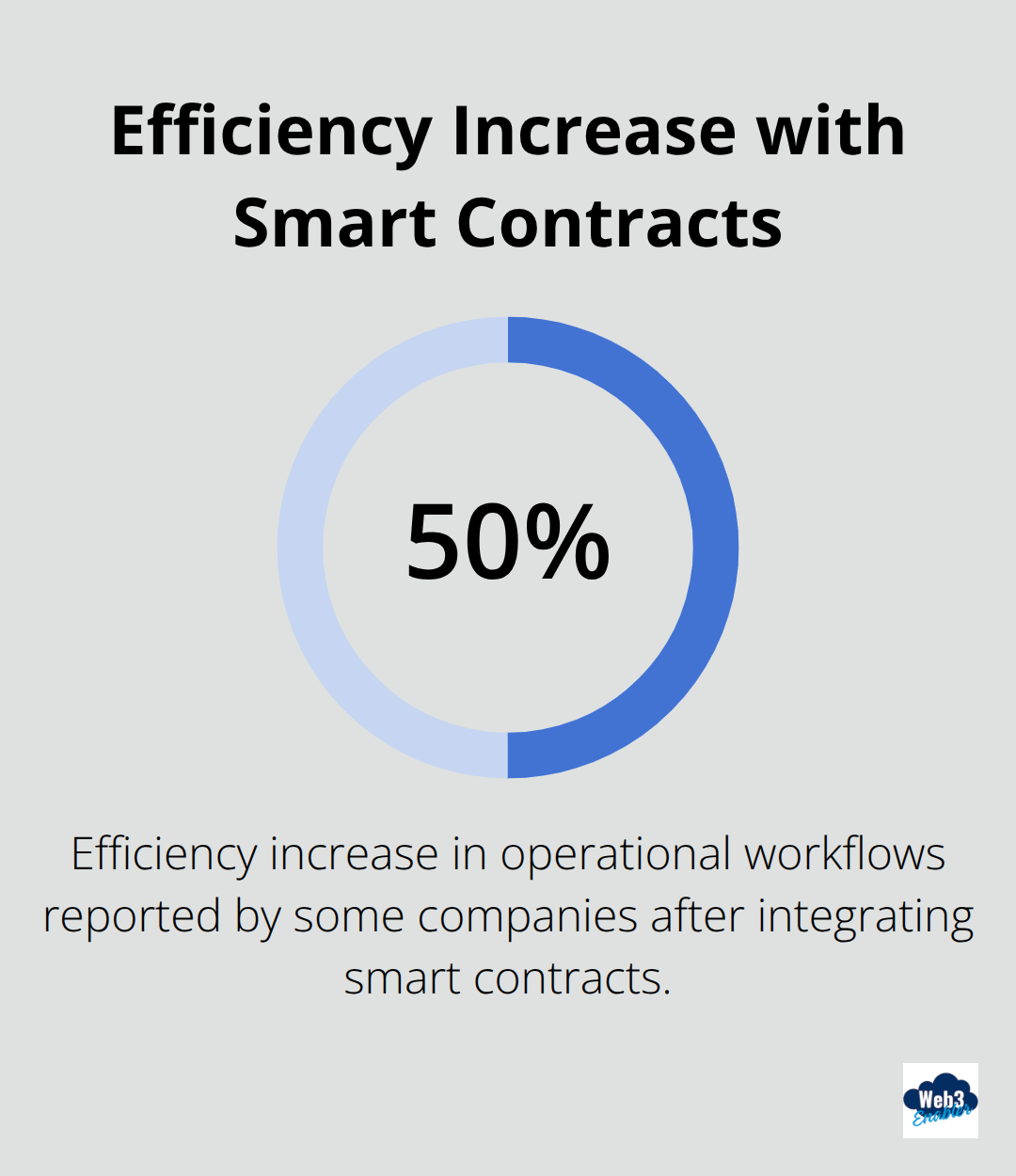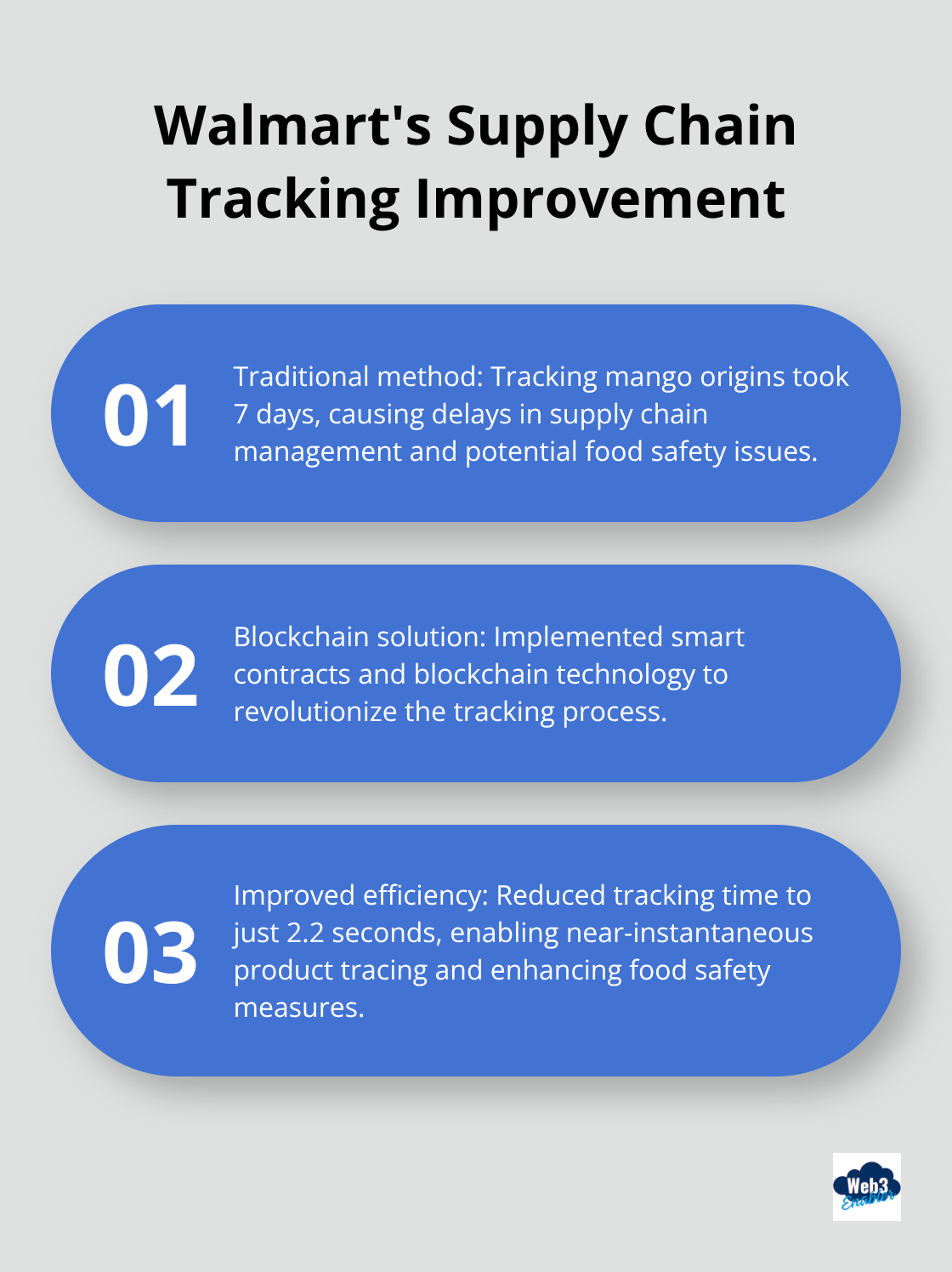Ready to revolutionize your business processes? At Web3 Enabler, we’re all about making blockchain automation sexy and accessible. Business smart contracts are the unsung heroes of the digital world, ready to transform how you do business. These self-executing agreements are like the James Bond of contracts – smooth, efficient, and always getting the job done.
Let’s dive into how smart contracts can streamline your operations, save you money, and make you look like a tech-savvy genius to your colleagues.
What Are Smart Contracts?
The Digital Handshake Revolution
Smart contracts are the digital equivalent of a handshake deal, but with way more pizzazz (and a lot less awkward sweaty palms). These self-executing contracts live on the blockchain, ready to spring into action when specific conditions are met. Think of them as the ultimate “if this, then that” statements, but for business transactions.
The ABCs of Smart Contract Superpowers
At their core, smart contracts are just lines of code that automate agreements. When the predefined conditions are met, boom! The contract executes itself faster than you can say “blockchain revolution.” No more waiting for Karen from accounting to process your invoice or for that one guy in legal to give the green light.
A report by Deloitte found that 39% of executives believe blockchain technology will disrupt their business model in the next five years. And smart contracts are leading the charge in this disruption, promising to slash operational costs and speed up processes across industries.

Why Smart Contracts Are the Cool Kids on the Block(chain)
Smart contracts come with a buffet of benefits that’ll make your business processes drool:
- Lightning-fast execution: These bad boys speed up contract execution, completing tasks in seconds that would typically take days or weeks with traditional contracts.
- Cost-cutting ninja: The elimination of middlemen and reduction of paperwork leads to significant savings (we’re talking a potential 30% reduction in contract management costs in some sectors).
- Tamper-proof security: Once deployed, these contracts are harder to hack than Fort Knox. They’re encrypted and distributed across the blockchain, making them virtually impenetrable.
Old School vs. New Cool: Traditional Contracts vs. Smart Contracts
Let’s face it, traditional contracts are about as exciting as watching paint dry. They’re slow, prone to human error, and require more intermediaries than a game of telephone. Smart contracts, on the other hand, are like the cool new kid in school who knows all the latest tech tricks.
While traditional contracts rely on lawyers, notaries, and a small forest worth of paper, smart contracts cut through the red tape like a hot knife through butter. They execute automatically, reduce the risk of fraud, and create an immutable record of transactions.
A McKinsey report suggests that firms leveraging blockchain could see a value of up to $1 trillion annually through efficiency gains. That’s a lot of zeros that could be heading your way if you jump on the smart contract bandwagon.
The Future is Smart (Contracts)
As we move towards a more automated and efficient business landscape, smart contracts stand at the forefront of this revolution. They promise to transform not just how we conduct transactions, but how we think about trust and agreements in the digital age. In the next section, we’ll explore how businesses can implement these digital dynamos and start reaping the benefits. Get ready to say goodbye to paperwork and hello to the future of automated agreements!
How to Implement Smart Contracts in Your Business
Spotting Prime Candidates for Automation
Time to revolutionize your business processes! First, you need to identify which tasks are begging for a smart contract makeover. Look for repetitive processes that involve multiple parties, require verification, or trigger payments. Supply chain management, insurance claims processing, and real estate transactions all scream “automate me!”
For instance, in supply chain management, smart contracts automate tasks like managing payroll, inventory, and vendor payments. It’s like having a digital assistant that never sleeps (or asks for coffee breaks).
Picking Your Blockchain Playground
Choosing the right blockchain platform is like selecting the perfect dance partner for your smart contract tango. Ethereum is the belle of the ball, with over 1,000 decentralized applications twirling on its blockchain as of early 2023. But don’t ignore other suitors like Hyperledger Fabric or Cardano, especially if you’re dealing with enterprise-level shenanigans.
Each platform has its own flavor. Ethereum rocks the public, permissionless scene, while Hyperledger Fabric shines in private, permissioned environments. Your choice should depend on your specific needs, scalability requirements, and how much privacy you want (think of it as the blockchain equivalent of choosing between a public beach or a private pool party).
From Code to Reality: Integration Steps
Let’s get down to the nitty-gritty. Here’s your roadmap to smart contract stardom:
- Define your contract logic: Outline the terms, conditions, and actions of your smart contract. This is your blueprint, so make it tighter than your jeans after Thanksgiving dinner.
- Develop and test: Write your smart contract code (or hire a tech wizard to do it). Then test it more times than you’ve rewatched your favorite Netflix series. Once deployed, these contracts are harder to change than your stubborn uncle’s political views.
- Deploy on the blockchain: When you’re confident in your code, unleash it on your chosen blockchain platform. It’s like sending your digital baby off to college (but with less emotional baggage).
- Connect to your existing systems: This is where the magic happens. Integrate your smart contract with your current business processes and systems. You might need to create APIs or use blockchain oracles to connect real-world data with your smart contract (it’s like teaching your old dog some seriously cool new tricks).
- Train your team: Don’t leave your employees scratching their heads. Make sure they know how to work with these new tools. Think of it as teaching them to use a smartphone after years of carrier pigeons.
- Monitor and optimize: Keep an eye on your smart contracts’ performance. Be ready to deploy new versions if needed (because even digital contracts need a wardrobe update now and then).
Implementing smart contracts isn’t just a tech upgrade – it’s a business transformation that would make even Optimus Prime jealous. It requires careful planning, cross-departmental collaboration, and a willingness to rethink traditional processes.
But hold onto your hats, because the payoff can be huge. Some companies have reported a 50% efficiency increase in their operational workflows after integrating smart contracts. That’s not just a marginal improvement – that’s like going from a bicycle to a rocket ship!

Now that you’re armed with the know-how to implement smart contracts, let’s explore some real-world applications that’ll make your business processes smoother than a freshly waxed surfboard.
How Are Smart Contracts Transforming Industries?
Supply Chain Revolution
Smart contracts shake up industries faster than you can say “blockchain revolution.” These digital dynamos transform real-world business processes, making traditional methods look as outdated as a flip phone at a tech conference.
Walmart, the retail giant, has hopped on the smart contract bandwagon to manage their supply chain. They use these clever contracts to track products from farm to fork, ensuring food safety and reducing waste. The result? Their blockchain solution reduced the time for tracking mango origins from seven days to 2.2 seconds, promoting greater transparency across Walmart’s food supply chain. It’s like having a digital food detective on the case 24/7!

But it’s not just about tracking lettuce. Smart contracts also automate payments to suppliers the moment goods arrive. No more chasing invoices or dealing with late payments. It’s instant gratification for your cash flow.
Financial Services and Insurance: From Snooze-Fest to Thrill Ride
The financial world gets a smart contract makeover, and it’s anything but boring. These digital agreements turn insurance claims from a paperwork nightmare into a dream-like experience.
Picture this: You’re in a fender bender. Instead of spending hours on the phone with your insurance company, a smart contract automatically processes your claim. Sensors in your car trigger the contract, which checks police reports and weather conditions. If everything checks out, boom! Your claim gets approved and paid out faster than you can say “totaled.”
AXA, a major insurance player, tested smart contracts for flight delay insurance. If your flight was delayed, the smart contract would automatically trigger a payout. No forms, no fuss, just funds in your account (it’s like having a personal insurance fairy godmother, minus the wand and the “bibbidi-bobbidi-boo”).
Real Estate: Property Deals Made Easy
Buying a house used to be about as fun as watching paint dry. Enter smart contracts, stage left. They turn the property game on its head, making transactions faster than a New York minute.
Smart contracts can automate the entire property purchase process. From escrow to title transfers, these digital agreements handle it all. The moment funds hit the escrow account, ownership can transfer automatically. No more waiting for paperwork to crawl through the system like a sloth on sedatives.
But it’s not just about buying and selling. Smart contracts revolutionize property management too. Rent payments, maintenance requests, even utility bill splitting for roommates – all can be automated with smart contracts. It’s like having a super-efficient, never-sleeps property manager without the attitude.
The real estate industry is notorious for its paperwork and middlemen. Smart contracts cut through this red tape like a hot knife through butter. They reduce fraud, speed up processes, and make property deals more transparent than a freshly Windexed window.
Wrapping Up
Smart contracts revolutionize business operations with lightning-fast execution, Fort Knox-level security, and significant cost savings. These digital agreements slash processing times, ensure tamper-proof transactions, and eliminate expensive middlemen. As industries embrace blockchain automation, smart contracts will become as ubiquitous as smartphones in daily business operations.
Smart contracts aren’t just for tech giants or blockchain enthusiasts. Every business can benefit from this efficiency-boosting technology, regardless of size or sector. From startups to Fortune 500 companies, smart contract solutions await to transform processes and streamline operations.
At Web3 Enabler, we make blockchain automation accessible and practical for businesses like yours. We specialize in connecting blockchain technology with existing corporate infrastructure, offering Salesforce Native blockchain solutions. Don’t let your business processes remain stuck in the past (it’s time to embrace the future and give your efficiency a turbo boost with smart contracts).








